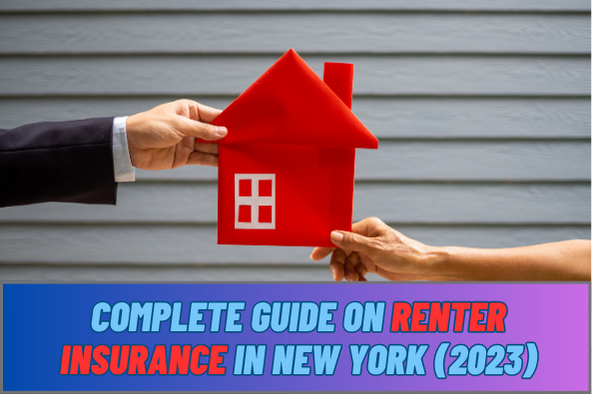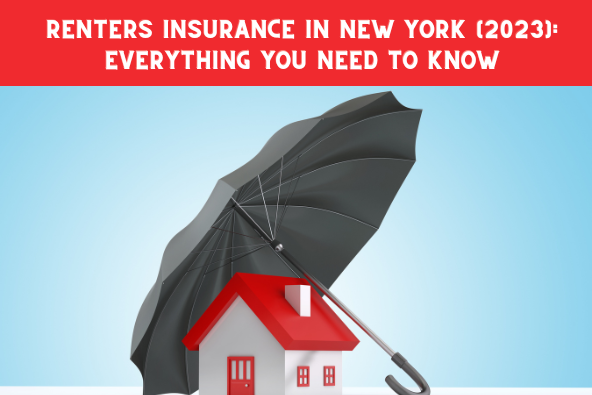Renter Insurance in New York (2023)
Are you renting a home or apartment and wondering if you need renter’s insurance? If so, you’re in the right place! In this guide, we will go over what renter’s insurance is, what it covers, and what it doesn’t cover.
First, it’s important to note that as a tenant, you are not responsible for ensuring the building you live in. That’s the landlord’s responsibility. However, you are responsible for taking out renter’s insurance to protect your personal belongings and provide liability coverage.
What is renter’s insurance?
Renter’s insurance, also known as tenants insurance or HO4 renter’s insurance, is an insurance policy that you take out when renting a property. The purpose of this policy is to protect your personal belongings and provide liability coverage. Renter’s insurance is similar to homeowner’s insurance because it covers the same scenarios, such as fire or theft. However, renter’s insurance is significantly less expensive because it only ensures your belongings and not the physical building.

What does renter’s insurance cover?
- Well, rent insurance doesn’t only cover your personal items, it also pays your reasonable expenses if you have to temporarily relocate due to the building repairs.
- It includes liability insurance and provides medical payments to anybody injured on the property as long as the injury isn’t due to a structural issue with the building.
- Your renter’s insurance policy will reimburse you for the cost of repairing or replacing your personal items if they’re lost or damaged due to the specific events listed in your policy.
- Renter’s insurance protects your belongings, whether or not you were in the building during the event. For instance, if a fire starts in the building that you’re renting while you’re at work, your renter’s insurance will still cover the losses of your personal belongings, even though you were away from the building when the fire started.
- Additionaly, renter’s insurance doesn’t only cover your personal items, it also pays your reasonable expenses if you have to temporarily relocate due to building repairs. It includes liability insurance and provides medical payments to anybody injured on the property as long as the injury isn’t due to a structural issue with the building.
- Your renter’s insurance policy will reimburse you for the cost of repairing or replacing your personal items if they’re lost or damaged due to the specific events listed in your policy. Most policies include coverage for events such as fire and smoke damage, lightning, windstorm, and hail damage, explosions, riot or civil unrest, damages caused by aircraft or vehicles, vandalism, theft, volcanic eruption, an object falling on your property, damage from snow, ice, and sleet, accidental discharge of water and stream or cracking and burning from within certain household systems or appliances, household appliances or systems freezing, and accidental damage from artificially-generated electric currents.
What doesn’t renter’s insurance cover?
As with any insurance policy, your renter’s insurance has exclusions. There are four main exclusions to most rental insurance policies:
- Flood damage
- Earthquake damage
- Infestations
- Your roommate’s belongings.
If you want coverage for those four events, you have to purchase additional optional coverage. Depending on your state laws, you may be able to add a secondary insured on renter’s insurance to cover your roommate’s belongings as well, but it’s best practice for each person to get their own individual policy.
Coverage Options
You can customize your renter’s insurance policy to fit your needs. For example, if you live in an area prone to natural disasters like earthquakes, floods, or sinkholes, you can add coverage for these events. You can also increase the amount of coverage for your personal belongings as an optional add-on. Speak to your insurance provider about the add-ons you want in your renter’s insurance policy.
The average renter’s insurance policy includes $100,000 worth of liability insurance, which should be sufficient for most people. However, you have the option of adding more liability coverage if you wish.

Cost
The cost of renter’s insurance depends on the level of coverage you want and where you live. In the US, the average annual cost of renter’s insurance is about $168. Louisiana has the highest average annual cost at $262, while Wyoming has the lowest average cost at $101.
Renter’s insurance is affordable and worth paying for to protect yourself from unexpected damages. Nearly every insurance company provides renter’s insurance, and you can usually complete an application online. Some insurance companies offer a deal if you purchase both your car and renter’s insurance through them. Shop around to find the best deal, and according to US News, the cheapest renter’s insurance providers include Nationwide, State Farm, and Farmers.
Common Questions/ FAQs

Is renter’s insurance required by law?
No, it’s not, but many landlords require tenants to have renter’s insurance as part of the lease agreement. Always read the lease agreement carefully before signing it to ensure you meet all the requirements and that you’re comfortable with them.
Is there pit bull-friendly renter’s insurance?
Unfortunately, many insurers consider pit bulls to be an aggressive breed, which makes it difficult for pit bull owners to be approved for renter’s insurance. If you answer pit bull on your renter’s insurance application, most providers will decline your application. However, some insurers like State Farm approve renter’s insurance for pit bull owners.
Does renter’s insurance cover trampolines?
No, you cannot backdate renter’s insurance, especially if you’re trying to obtain coverage for a loss that already happened. It’s essential to obtain your renter’s insurance policy as soon as you move into your rented home to ensure you’re protected from day one.
Can you backdate renter’s insurance?
Yes, theft of your personal belongings is generally covered under renter’s insurance.
Does renter’s insurance cover theft and mold?
Whether or not your renter’s insurance covers a trampoline depends on your insurance provider and policy. Some insurance companies will approve your application if you disclose that you own a trampoline, while others won’t. Even if the insurance company approves your application, your premiums will be higher if you own a trampoline.
Does renter’s insurance cover mold?
Renter’s insurance is there to cover you from damage caused by sudden events, for example, freezing cold weather can cause the pipes from your house to burst, flooding your basement.
Does renter’s insurance cover broken windows?
If it is caused by natural phenomena such as hail, your insurance will cover the repair or replacement cost. However, if the windows break due to human error, the insurance won’t cover it.
In case of damage to your belongings, such as fire or lightning, your renter’s insurance policy will pay you the value of the damaged items, minus the deductible. If your home becomes uninhabitable due to the damage, your insurance will also cover the cost of meals, hotels, and other expenses you may incur.
Renter’s insurance is not legally required, but it is a good investment for peace of mind. When choosing renter’s insurance, consider your needs, research insurance companies in your area, and shop around for the best deal. Be sure to ask your agent or insurance provider if you have any questions.




